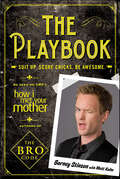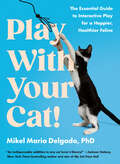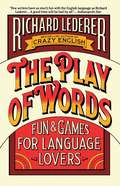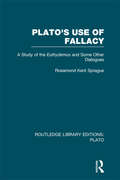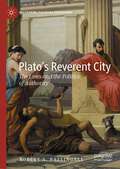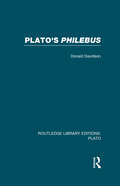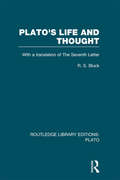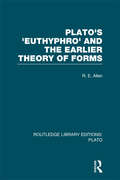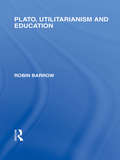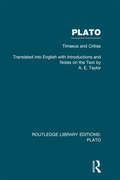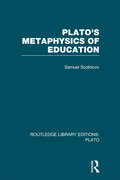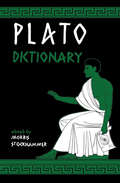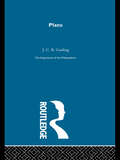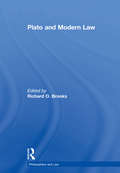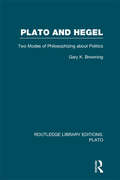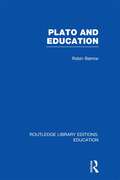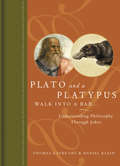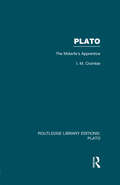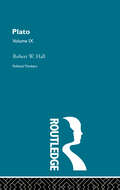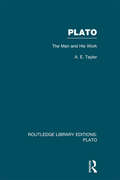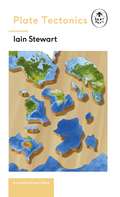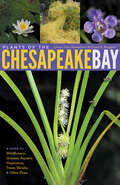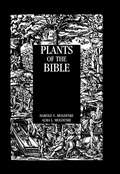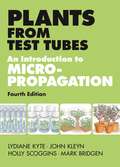- Table View
- List View
The Playbook: Suit Up. Score Chicks. Be Awesome
by Barney Stinson Matt KuhnBestselling author of The Bro Code, Barney Stinson of How I Met Your Mother fame, presents The Playbook—like Neil Strauss’s The Gamefor Bros, The Playbook offers advice on the many creative and resourceful ways Barney’s developed to wine, dine, and score with “The Ladies.”Since the dawn of history man has searched for the answer to the most fundamental of questions: “Why am I here…not banging chicks?” The search is over. Now, with the help of The Playbook, you’ll be able to approach any beautiful woman, discover her innermost passion, and use that to trick her into sleeping with you. You’ll master more than seventy-five seduction techniques, developed by pickup guru and all-around good guy Barney Stinson, guaranteed to turn you into a bona fide ladies’ man. Featuring the famous plays including: · The Lorenzo Von Matterhorn · Mrs. Stinsfire · The Ted Mosby · The Time Traveler · The “SNASA” · The Scuba Diver · The “He’s Not Coming” …and other greatest hits from Barney Stinson’s secret Playbook of legendary moves. So suit up and get ready to be schooled in awesomeness.
Play With Your Cat!: The Essential Guide to Interactive Play for a Happier, Healthier Feline
by Mikel Maria DelgadoA fun, comprehensive guide to the key to cat happiness—play!Millions of households in the United States have at least one cat as part of their family. Yet despite their popularity, cats continue to be misunderstood by their owners. This lack of understanding can lead to bored, frustrated, and under-stimulated cats, resulting in health and behavior problems. In Play with Your Cat!, animal behavior expert Dr. Mikel Maria Delgado shows cat parents what they may be missing: interactive play. Using an evidence-based approach and the latest scientific research, Delgado: shows why cats need play and how it is essential to their well-beingprovides readers with techniques on how to engage their cat in playreveals how to use play to improve problematic cat behaviors Playfully written and with fun illustrations, Play with Your Cat! is an essential read for cat parents looking to understand their feline friend—and have some fun in the process.
The Play of Words
by LedererDo you know the connection between the expression A HARROWING EXPERIENCE and agriculture, between BY AND LARGE and sailing, between GET YOUR GOAT and horses, or between STEAL YOUR THUNDER and show business? You probably have heard the comparisons HAPPY AS A CLAM, SMART AS A WHIP, PLEASED AS PUNCH, DEAD AS A DOORNAIL - but have you ever wondered why a clam should be happy, a whip smart, punch pleased, and a doornail dead? By playing the fifty games in this book , you'll discover the answers to these questions as well as hundreds of other semantic delights that repose in our marvelous English language.
Play in the Early Years
by Marilyn FleerThe Early Years Learning Framework is a key component of the Australian Government's National Quality Framework for early childhood education and care. Play-based learning is an important focus in both the Framework and in early childhood education degrees at Australian universities. Play in the Early Years is a comprehensive study of pedagogy and play in early childhood education by a globally recognised leader in the field. Marilyn Fleer examines how play has been thought about across time, culture and institutions, including in childcare, family day care, schools and community groups. The book presents and analyses the latest research and theories about early childhood pedagogy and play. Vignettes and real-world examples help students connect theory to practice, while end-of-chapter glossaries help to consolidate understanding of key concepts and ideas. This is an accessible and engaging textbook that will be an invaluable resource for practitioners and undergraduate students of early childhood education.
Plato's Use of Fallacy: A Study of the Euthydemus and some Other Dialogues (Routledge Library Editions: Plato)
by Rosamond K SpragueThere are many fallacious arguments in the dialogues of Plato. The author argues that Plato was fully conscious of the fallacious character of at least an important number of these arguments and that he sometimes made deliberate use of fallacy as an indirect means of setting forth certain of his fundamental philosophical views. Plato introduces them, the author maintains, for the purpose of working out their implications. Plato is thus able to expose them for what they are, to clear away possible lines of attack upon his own position, and even to show that when the proper correction is applied his own views receive support.
Plato’s Reverent City: The Laws and the Politics of Authority (Recovering Political Philosophy)
by Robert A. BallingallThis book offers an original interpretation of Plato’s Laws and a new account of its enduring importance. Ballingall argues that the republican regime conceived in the Laws is built on "reverence," an archaic virtue governing emotions of self-assessment—particularly awe and shame. Ballingall demonstrates how learning to feel these emotions in the right way, at the right time, and for the right things is the necessary basis for the rule of law conceived in the dialogue. The Laws remains surprisingly neglected in the scholarly literature, although this is changing. The cynical populisms haunting liberal democracies are focusing new attention on the “characterological” basis of constitutional government and Plato’s Laws remains an indispensable resource on this question, especially when we attend to the theme of reverence at its core.
Plato's Philebus: Plato: Plato's Philebus (Routledge Library Editions: Plato)
by Donald DavidsonThe Philebus is hard to reconcile with standard interpretations of Plato’s philosophy and in this pioneering work Donald Davidson, seeks to take the Philebus at face value and to reassess Plato’s late philosophy in the light of the results. The author maintains that the approach to ethics in the Philebus represents a considerable return to the methodology of the earlier dialogues. He emphasizes Plato’s reversion to the Socratic elenchus and connects it with the startling reappearance of Socrates as the leading voice in the Philebus.
Plato's Life and Thought: With a Translation of the Seventh Letter (Routledge Library Editions: Plato)
by R S BluckR. S. Bluck’s engaging volume provides an accessible introduction to the thought of Plato. In the first part of the book the author provides an account of the life of the philosopher, from Plato’s early years, through to the Academy, the first visit to Dionysius and the third visit to Syracuse, and finishing with an account of his final years. In the second part contains a discussion of the main purpose and points of interest of each of Plato’s works. There is a chapter on Plato’s central doctrine, the Theory of Ideas, and a translation of Plato’s Seventh Letter, which not only provides valuable additional material for the study of Plato’s thought but also contains a vivid account of many incidents in Plato’s life.
Plato's Euthyphro and the Earlier Theory of Forms: A Re-Interpretation of the Republic (Routledge Library Editions: Plato)
by R E AllenPlato’s Euthyphro is important because it gives an excellent example of Socratic dialogue in operation and of the connection of that dialectic with Plato’s earlier theory of Forms. Professor Allen’s edition of the dialogue provides a translation with interspersed commentary, aimed both at helping the reader who does not have Greek and also elucidating the discussion of the earlier Theory of Forms which follows. The author argues that there is a theory of Forms in the Euthyphro and in other early Platonic dialogues and that this theory is the foundation of Socratic dialogue. However, he maintains that the theory in the early dialogues is a realist theory of universals and this theory is not to be identified with the theory of Forms found in the Phaedo, Republic, and other middle dialogues, since it differs on the issues of ontological status.
Plato, Utilitarianism and Education (International Library of the Philosophy of Education Volume 3)
by Robin BarrowThree lines of argument are central to this book: that Plato's views as expounded in the Republic indicate that he was a utilitarian; that utilitarianism is the only acceptable ethical theory; that these conclusions have significant repercussions for education. Throughout the book the exposition of utilitarianism and the interpretation of the Republic are closely linked. The author assesses the nature of recent Platonic criticism and provides a critical summary of the Republic. He expounds and defends utilitarianismn and examines in greater depth the consequences for education of accepting a utilitarian position, showing how, for example, from this standpoint such key terms in educational debate as 'autonomy' and 'self-development' must be reassessed as educational objectives.
Plato: Timaeus and Critias (Routledge Library Editions: Plato)
by A E TaylorPlato’s Timaeus was his only cosmological dialogue and for almost thirteen hundred years it provided the basis in the West for educated people’s general view of the natural world. The author provides a translation of this important work, together with the Critias – the source of the legendary tale of Atlantis. He has taken particular care to provide an accurate rendering of Plato’s words and to avoid putting his own or any other interpretation on the works.
Plato 's Metaphysics of Education (Routledge Library Editions: Plato)
by Samuel ScolnicovThis volume provides a comprehensive, learned and lively presentation of the whole range of Plato’s thought but with a particular emphasis upon how Plato developed his metaphysics with a view to supporting his deepest educational convictions. The author explores the relation of Plato’s metaphysics to the epistemological, ethical and political aspects of Plato’s theory of education and shows how Plato’s basic positions bear directly on the most fundamental questions faced by contemporary education.
Plato Dictionary
by Morris StockhammerIn this companion volume to the well-known Aristotle Dictionary, Morris Stockhammer offers a comprehensive and alphabetically organized glossary of the basic writings of Plato. For many years, the editor scanned through the dialogues of Plato in an effort to find and collect those pithy thoughts that represent the essence of Platonism. The perfect dictionary for philosophers and students of ancient philosophy, the Plato Dictionary includes explanations, definitions, and explications of Plato&’s vocabulary often using his own words to complete the description. Each entry also includes a citation from Plato&’s indispensible oeuvre. Morris Stockhammer was a lexicographer and historian known for his subject dictionaries on famous philosophers including Immanuel Kant, Plato, Karl Marx, and Thomas Aquinas. He also published on European economics and history.
Plato-Arg Philosophers
by J.C.B. GoslingThis book is available either individually, or as part of the specially-priced Arguments of the Philosphers Collection.
Plato and Modern Law (Philosophers And Law Ser.)
by Richard O. BrooksThis audacious collection of modern writings on Plato and the Law argues that Plato's work offers insights for resolving modern jurisprudential problems. Plato's dialogues, in this modern interpretation, reveal that knowledge of the functions of law, based upon intelligible principles, can be reformulated for relevance to our age. Leading interpreters of Plato: Vlastos, Hall, Strauss, Weinrib, Annas, and Morrow, are included in the collection. The editor supplies an insightful introduction and extensive bibiography to the collection.
Plato and Hegel: Two Modes of Philosophizing about Politics (Routledge Library Editions: Plato)
by Gary BrowningHegel and Plato are united as political theorists by the convergence of their philosophical aspirations. But their political writings manifest the general disparities involved in their particular ways of seeking to fulfil these aspirations. Professor Browning compares the political thought of Plato and Hegel by locating their political theorizing within the context of their divergent modes of philosophizing.
Plato and Education (Routledge Library Editions: Education)
by Robin BarrowThis introduction to Plato’s philosophical and educational thought examines Plato’s views and relates them to issues and questions that occupy philosophers of education. Robin Barrow stresses the relevance of Plato today, while introducing the student both to Plato’s philosophy and to contemporary educational debate. In the first part of the book the author examines Plato’s historical background and summarizes the Republic. Successive chapters are concerned with the critical discussion of specific educational issues. He deals with questions relating to the impartial distribution of education, taking as a starting point Plato’s celebrated dictum that unequals should be treated unequally. He examines certain methodological concepts such as ‘discovery-learning’ and ‘play’ and also raises the wider question of children’s freedom. He looks critically at the content of the curriculum and discusses Plato’s theory of knowledge and attitude to art. Finally Robin Barrow discusses Plato’s view of moral education and the related problem of what constitutes moral indoctrination
Plato and a Platypus Walk Into a Bar...: Understanding Philosophy Through Jokes
by Thomas Cathcart Daniel KleinNew York Times Bestseller: This entertaining-yet-enlightening crash course on philosophy is “an extraordinary read” (Orlando Sentinel). Here's a lively, hilarious, not-so-reverent journey through the great philosophical traditions, schools, concepts, and thinkers. It’s Philosophy 101 for everyone who knows not to take all this heavy stuff too seriously. Some of the Big Ideas covered are Existentialism (what do Hegel and Bette Midler have in common?), Philosophy of Language (how to express what it’s like being stranded on a desert island with Halle Berry), Feminist Philosophy (why, in the end, a man is always a man), and much more. Finally—it all makes sense!“A hoot.” —Chicago Sun-Times“An extraordinary read you’ll want to share with as many people as possible.” —Orlando Sentinel“The zaniest bestseller of the year.” —The Boston Globe
Plato: The Midwife's Apprentice (Routledge Library Editions: Plato)
by I M CrombieIn Plato’s Theaetetus, Socrates is portrayed as a midwife to the intellect, a metaphor for his task as a dialectician as he seeks to help give birth to wisdom. Thus it is that the author refers to Plato as the midwife’s apprentice. This volume represents an attempt to provide a more manageable account of the author’s two volume magnum opus, An Examination of Plato’s Doctrines. An accessible and lucid introduction to Plato’s ideas is provided which nonetheless challenges traditional interpretations. In particular the author is concerned to offer an interpretation of the significance of what Plato said. The chapters are arranged by topic, for ease of comprehension.
Plato (Political Thinkers Ser. #Vol. 9)
by Robert HallFirst published in 1981 this unique study discusses the evolution of Plato's thought through the actual developments in Athenian democracy, the book also demonstrates Plato's continuing responses to changes in political theory and argues for a new understanding of Plato's goals for the state and his ultimate concern for the moral well-being of the citizens.
Plato: The Man And His Work (Routledge Library Editions: Plato)
by A.E. TaylorThis book provides an introduction to Plato’s work that gives a clear statement of what Plato has to say about the problems of thought and life. In particular, it tells the reader just what Plato says, and makes no attempt to force a system on the Platonic text or to trim Plato’s works to suit contemporary philosophical tastes. The author also gives an account that has historical fidelity - we cannot really understand the Republic or the Gorgias if we forget that the Athens of the conversations is meant to be the Athens of Nicias or Cleon, not the very different Athens of Plato’s own manhood. To understand Plato’s thought we must see it in the right historical perspective.
Plate Tectonics: Discover how our planet works from the inside out (The Ladybird Expert Series #4)
by Iain StewartHow do plate tectonics work? Learn from the experts in the ALL-NEW LADYBIRD EXPERT SERIESDiscover in this accessible and authoritative introduction the fundamental theory of how our dynamic planet works.You'll learn about the make up of the Earth in the past and the present, from monsoon-like currents in our planet's radioactive interior to magnetic force lines and what the planet would look like without water.You will learn about:- Our planet as an active living system- The planetary force field- Fault lines that cross continents- How plates tectonics protects life on Earth- And much more . . .Written by the celebrated geologist, academic and popular science presenter Iain Stewart, Plate Tectonics explores the Earth as a planetary machine and investigates the people and ideas that changed the way we look at the world.Learn about other topics in the Ladybird Experts series including Gravity, Quantum Physics, Climate Change and Evolution.Written by the leading lights and most outstanding communicators in their fields, the Ladybird Expert books provide clear, accessible and authoritative introductions to subjects drawn from science, history and culture.For an adult readership, the Ladybird Expert series is produced in the same iconic small hardback format pioneered by the original Ladybirds. Each beautifully illustrated book features the first new illustrations produced in the original Ladybird style for nearly forty years.
Plants of the Chesapeake Bay: A Guide to Wildflowers, Grasses, Aquatic Vegetation, Trees, Shrubs, and Other Flora
by Lytton John Musselman David A. KnepperSecond Place Winner of the Design and Effectiveness Award of the Washington PublishersButtonbush. Hercules' Club. Panic Grass. Tearthumb. Beach Spurge. Sea Rocket. Ladies' Tresses. These name a few of the wild and wonderful plants found in this quick reference guide to plants of the Chesapeake Bay. Written by wetland scientists with decades of experience in the Bay's waterways, this guide includes detailed descriptions and beautiful photographs of the plants most commonly found in the Chesapeake Bay. Grasses, trees, wildflowers, aquatic vegetation—if it grows in the tidal or nearshore regions of the Bay, chances are it is in this book, the features of which include• over 200 illustrations• information on more than 100 species of plants• clear, accessible descriptions of each plant accompanied by close-up photographs for quick, accurate identification• discussion of where to find each plant, how they reproduce, and how humans use them• easy-to-follow organization by habitatThe guide's vivid text and photographs make the wide array of plants along the waters, marshes, and shorelines of the Chesapeake Bay easy to identify and wondrous to behold. Its compact, portable design encourages naturalists, local residents, boaters, researchers, and the curious-minded alike to throw the guide in their pack and explore the botanical bounty of the Chesapeake Bay.
Plants Of The Bible
by MoldenkeFirst published in 2005. Routledge is an imprint of Taylor & Francis, an informa company.
Plants from Test Tubes: An Introduction to Micropropogation, 4th Edition
by Holly Scoggins Mark BridgenThirty years ago, in vitro propagation was a new technique for producing plants, and Lydiane Kyte’s Plants from Test Tubes became the standard work on the topic.The new fourth edition has been thoroughly revised and updated to reflect the many advances in science and technology, including the five accepted sequential stages of micropropagation. Ten new plants have been added. This in turn has greatly expanded the already extensive bibliography. Among the new topics that have been introduced or expanded on are embryo culture for breeding, somaclonal variation, anther culture, somatic embryogenesis, cryopreservation, and genetic engineering. More ornamental plant examples are given and many new illustrations provided, including a chronology of discoveries in micropropagation.
